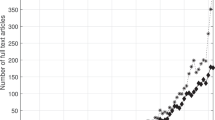Abstract
A previous article argued for the relevance of theological ethics to pastoral counseling. This article suggests an ethical method with five levels of rationality. These levels enable a practitioner to move from concrete interaction with persons to the most abstract generalizations about the nature of God and human life. Such a method describes a helpful way of bringing theological/ethical concern to counseling in a nonmoralistic style.
Similar content being viewed by others
References
I wish to acknowledge a special debt to Donald E. Miller, professor of Ethics and Christian Education at Bethany Theological Seminary, for significant material in this article.
Eugene F. Ropp, “When Two Become One Become Two,”Brethren Life and Thought, 1976, pp. 133–317.
Author information
Authors and Affiliations
Rights and permissions
About this article
Cite this article
Poling, J.N. Ethical reflection and pastoral care, part II. Pastoral Psychol 32, 160–170 (1984). https://doi.org/10.1007/BF01040936
Issue Date:
DOI: https://doi.org/10.1007/BF01040936



